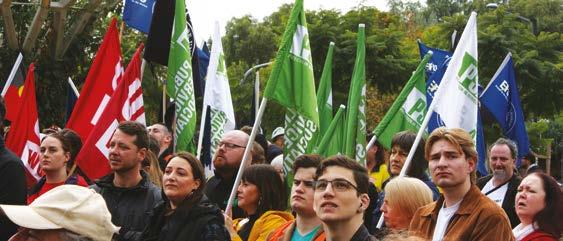
3 minute read
BI - PARTISAN SUPPORT SEES ANTI - PROTEST LAWS TOUGHENED|Public Sector Review | August 2023
The PSA was among the many unions and other interest groups which earlier this year publicly opposed legislative amendments which have the potential to severely curtail citizens’ rights to protest.
In May, the State Government rushed through amendments to the Summary Offences Act 1953, enabling massive fines and significant jail time to be imposed on individuals engaging in public activities such as protests and rallies.
The move followed a public protest by members of activist group Extinction Rebellion, including an individual abseiling from the Morphett Street Bridge in Adelaide causing disruption to peak hour morning traffic.
Opponents of the legislation believe the laws could have a chilling effect on democracy.
Especially troubling was the haste with which Premier Peter Malinauskas sought to pass the legislation, and the lack of consultation about the implications of the amendments.
The amended legislation could see a person who “intentionally or recklessly engages in conduct that obstructs the free passage of a public place” face up to three months in jail or a maximum fine of $50,000.
Legal advice provided to SA Unions raised concerns that: “the Bill significantly broadens the circumstances in which peaceful protesters may be prosecuted and held criminally liable for obstruction offences, and with no discretion to excuse conduct that is reasonable or lawful.”
PSA General Secretary Natasha Brown described the legislation as a ‘knee-jerk reaction’ to the recent protesting in the Adelaide CBD, which caused disruption to morning traffic and some businesses.
“There was no reason to introduce such draconian laws. Being able to stage public protests is an important cornerstone of our democratic society,”
she said.
“Citizens and groups such as trade unions need to be able to speak freely and use reasonable, peaceful means to make their views and criticisms heard.”
Public protests and rallies have long been a key element of union activism, a key tenet of free speech, and a right worth fighting for.
This right was articulated by Justice Sir Charles Bright following the 1970 Royal Commission into the September (Vietnam) Moratorium Demonstration in Adelaide.
In his report Justice Bright said:
“For one reason or another, I regard it as likely that various groups of Australians will be or become deeply dissatisfied about various matters, and desirous of effecting changes. The process is a natural and proper one in a democratic society. The methods adopted will vary. They will not always accord with statute and by-law. They are likely to include various kinds of marches and demonstrations.
… Such a group, by its policies and often by its methods, is likely to cause anger among citizens exposed to it. This is not by itself any reason for banning the activities of the group. … It would however be an extreme and in my opinion usually unjustifiable action by executive authority to prohibit a non-violent and in the main a law-abiding group from marching through the streets merely because a potentially violent and intolerant group might attack the first group and cause a public disturbance. ...”
Justice Bright set out the framework for public protest which has been in place and has worked well for our state for decades.
With the Government having a clear majority in the House of Assembly and support from the Opposition, the amendments were passed in the Lower House following just 22 minutes of debate.
Despite attempts at a filibuster in the Upper House, with marathon speeches from cross-bench members, government and opposition politicians together were able to vote the changes into law.
The PSA will keenly watch this space to see how police and the courts use the new legislative powers in relation to future protests.







